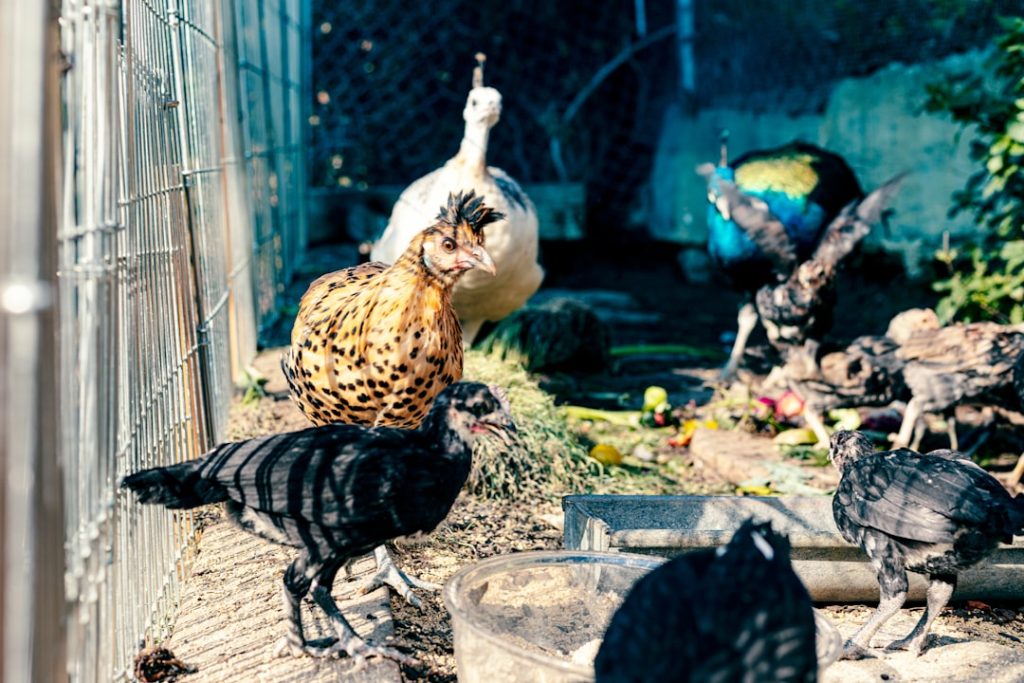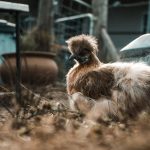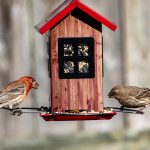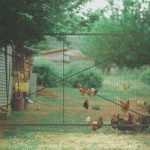Keeping chickens inside a fence is crucial for their safety and well-being. A fence provides a physical barrier that keeps the chickens contained within a designated area, preventing them from wandering off into dangerous territory. It also helps to protect them from predators, such as foxes, raccoons, and birds of prey, that may pose a threat to their safety.
Additionally, a fence can help to keep the chickens out of gardens or other areas where they may cause damage or become a nuisance. By keeping the chickens inside a fence, you can also better control their access to food and water, ensuring that they are properly nourished and hydrated. Overall, a fence provides a sense of security and protection for the chickens, allowing them to roam and forage in a safe and controlled environment.
Furthermore, keeping chickens inside a fence can also benefit the surrounding environment and community. By containing the chickens within a designated area, you can prevent them from causing damage to neighboring properties or disrupting local wildlife. This can help to maintain positive relationships with neighbors and minimize potential conflicts.
Additionally, a well-maintained chicken fence can contribute to the overall aesthetics of the property, creating a tidy and organized appearance. By keeping the chickens inside a fence, you can also better manage their waste and prevent it from spreading to unwanted areas. This can help to minimize odor and potential health hazards, creating a more pleasant environment for both the chickens and those around them.
Overall, keeping chickens inside a fence is essential for their safety and well-being, as well as for maintaining positive relationships with neighbors and the surrounding community.
Table of Contents
- 1 Choosing the Right Type of Fence for Your Chickens
- 2 Tips for Building a Secure Chicken Fence
- 3 Maintaining and Repairing Your Chicken Fence
- 4 Protecting Your Chickens from Predators
- 5 Ensuring Adequate Space and Enrichment Inside the Fence
- 6 The Benefits of Keeping Chickens Inside a Fence
- 7 FAQs
- 7.1 What are the benefits of keeping chickens inside a fence?
- 7.2 What type of fence is best for keeping chickens inside?
- 7.3 How tall should the fence be to keep chickens inside?
- 7.4 What are some tips for maintaining a chicken fence?
- 7.5 Are there any legal considerations for keeping chickens inside a fence?
Key Takeaways
- Keeping chickens inside a fence is important for their safety and protection from predators.
- Choosing the right type of fence, such as wire mesh or electric, is crucial for keeping chickens secure.
- Building a secure chicken fence involves burying the fence underground and adding a roof to prevent predators from digging or climbing in.
- Regular maintenance and repairs are necessary to ensure the chicken fence remains effective and secure.
- Protecting chickens from predators requires additional measures such as installing motion-activated lights or using guard animals.
Choosing the Right Type of Fence for Your Chickens
Fence Height and Spacing
The first consideration is the size of the fence, which should be tall enough to prevent the chickens from flying over it or predators from climbing over it. A fence that is at least 6 feet tall is generally recommended for most chicken breeds. Additionally, the spacing between the fence posts or wires should be small enough to prevent predators from squeezing through or reaching in to grab the chickens.
Fence Material and Durability
The material of the fence is also important, as it should be sturdy and durable enough to withstand the elements and potential predator attacks. Common materials for chicken fences include wire mesh, hardware cloth, and electric fencing.
Fence Visibility and Safety
Another important factor to consider when choosing a chicken fence is the visibility it provides. Chickens have poor depth perception and may have difficulty seeing obstacles or barriers that are not clearly visible. Therefore, it is important to choose a fence that is easily visible to the chickens, such as one with bright colors or reflective materials. This can help to prevent the chickens from accidentally flying into the fence or becoming entangled in it. Additionally, the visibility of the fence can also serve as a deterrent to potential predators, making it clear that the chickens are contained within a secure area.
Tips for Building a Secure Chicken Fence
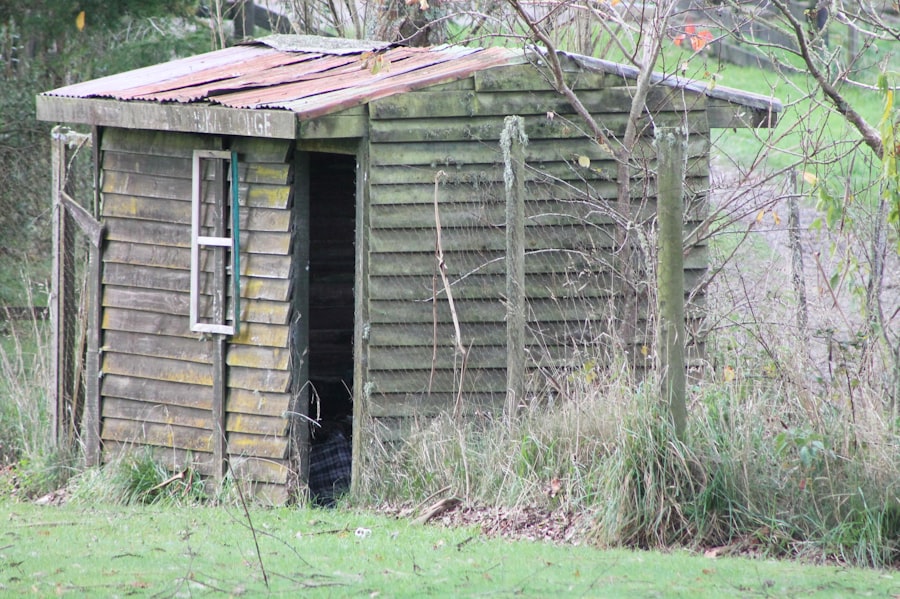
Building a secure chicken fence requires careful planning and attention to detail. One of the first steps in building a chicken fence is to properly prepare the area where the fence will be installed. This may involve clearing any debris or vegetation, leveling the ground, and removing any potential hazards that could pose a threat to the chickens or compromise the integrity of the fence.
Once the area is prepared, it is important to carefully measure and mark out the perimeter of the fence to ensure that it is properly aligned and will provide adequate space for the chickens. When it comes to actually constructing the fence, it is important to use high-quality materials and secure installation methods. The posts should be firmly anchored into the ground and spaced at regular intervals to provide adequate support for the fencing material.
Additionally, any gates or access points should be securely attached and equipped with latches or locks to prevent unauthorized entry or escape. It is also important to consider potential weak points in the fence, such as corners or areas where the ground may be uneven, and reinforce these areas as needed. Furthermore, it is important to regularly inspect and maintain the chicken fence to ensure that it remains secure and effective.
This may involve checking for signs of wear or damage, such as loose wires or posts, and making any necessary repairs or adjustments. Additionally, it is important to regularly clear away any debris or vegetation that may accumulate around the fence, as this can provide cover for potential predators or compromise the integrity of the fence. By following these tips for building a secure chicken fence, you can help to ensure the safety and well-being of your chickens.
Maintaining and Repairing Your Chicken Fence
Maintaining and repairing your chicken fence is essential for ensuring its long-term effectiveness and the safety of your chickens. Regular maintenance involves inspecting the fence for signs of wear or damage, such as loose wires, broken posts, or rusted hardware. It is important to address any issues promptly to prevent them from worsening and compromising the integrity of the fence.
This may involve tightening loose wires, replacing damaged posts, or applying rust-resistant coatings to metal components. In addition to regular maintenance, it is important to periodically inspect the entire perimeter of the fence to check for potential weak points or vulnerabilities. This may involve walking along the fence line and looking for signs of wear or damage, as well as checking for potential entry points for predators.
It is also important to clear away any debris or vegetation that may accumulate around the fence, as this can provide cover for potential predators or compromise the integrity of the fence. When it comes to repairing your chicken fence, it is important to use high-quality materials and secure installation methods to ensure that any repairs are effective and long-lasting. This may involve replacing damaged sections of fencing material, reinforcing weak points in the fence, or installing additional deterrents for potential predators.
It is also important to regularly inspect and maintain any gates or access points to ensure that they remain secure and functional. By maintaining and repairing your chicken fence on a regular basis, you can help to ensure the safety and well-being of your chickens while also prolonging the life of your fence.
Protecting Your Chickens from Predators
Protecting your chickens from predators is essential for their safety and well-being. There are several strategies that can be employed to deter potential predators and minimize the risk of attacks on your chickens. One effective strategy is to install predator-proof fencing around the perimeter of your chicken coop and run.
This may involve using materials such as wire mesh or hardware cloth with small openings that are difficult for predators to penetrate. Additionally, electric fencing can be an effective deterrent for larger predators such as foxes or coyotes. Another important strategy for protecting your chickens from predators is to secure their coop at night.
This may involve locking them inside their coop with sturdy doors and latches that are difficult for predators to open. Additionally, it is important to regularly inspect the coop for potential entry points such as holes or gaps in the walls or roof that could allow predators to gain access. Furthermore, it is important to be vigilant about potential threats from predators and take proactive measures to deter them from approaching your property.
This may involve removing attractants such as food scraps or garbage that could draw in potential predators, as well as using deterrents such as motion-activated lights or sound devices to scare off unwanted visitors. By employing these strategies for protecting your chickens from predators, you can help to ensure their safety and well-being while also minimizing potential conflicts with wildlife.
Ensuring Adequate Space and Enrichment Inside the Fence
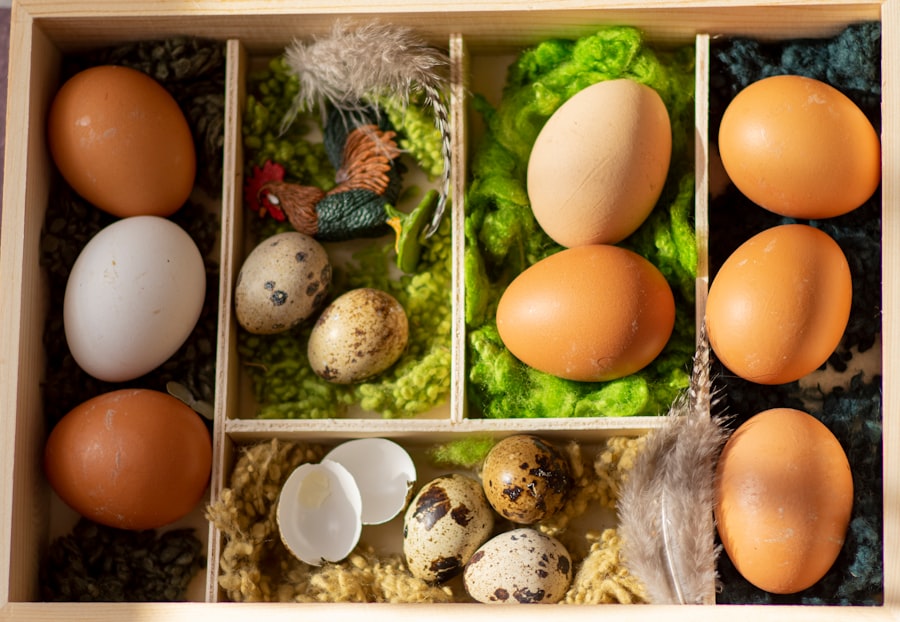
Providing Adequate Space
Chickens require space to move around freely, stretch their wings, dust bathe, and engage in natural behaviors such as pecking and scratching. Providing ample space inside their fenced area allows them to express these natural behaviors and helps to prevent stress-related behaviors such as feather pecking or aggression.
Enrichment Activities for Mental Stimulation
In addition to providing adequate space, it is important to provide enrichment activities inside the fenced area to keep your chickens mentally stimulated and engaged. This may involve providing items such as perches, dust bathing areas, hanging treats or toys, or access to natural vegetation such as grass or shrubs. Enrichment activities help to prevent boredom and encourage natural behaviors, which can contribute to overall health and well-being.
Fresh Air and Natural Light for Optimal Health
Furthermore, providing access to fresh air and natural light inside their fenced area is important for your chickens’ health and well-being. This may involve providing adequate ventilation inside their coop and run, as well as ensuring that they have access to natural sunlight during the day. Fresh air and natural light help to promote healthy respiratory function and vitamin D production in your chickens.
By ensuring that your chickens have adequate space, enrichment activities, fresh air, and natural light inside their fenced area, you can help to promote their overall health and well-being while also providing them with a stimulating and enriching environment.
The Benefits of Keeping Chickens Inside a Fence
Keeping chickens inside a fenced area offers numerous benefits for both the chickens and their owners. One of the primary benefits is increased safety and security for the chickens. A fenced area provides a physical barrier that helps to protect them from potential predators such as foxes, raccoons, dogs, or birds of prey.
This can help to minimize stress and anxiety for both the chickens and their owners while also reducing the risk of injury or loss due to predator attacks. Additionally, keeping chickens inside a fenced area can help to prevent them from wandering off into dangerous territory or causing damage on neighboring properties. This can help to maintain positive relationships with neighbors while also minimizing potential conflicts over property damage or nuisance behavior.
Furthermore, keeping chickens inside a fenced area can help to better manage their access to food and water while also preventing them from causing damage in gardens or other areas where they may not be welcome. This can help to promote responsible ownership while also minimizing potential health hazards associated with unsupervised foraging. Overall, keeping chickens inside a fenced area offers numerous benefits for both the chickens and their owners by providing increased safety and security while also promoting responsible ownership and positive relationships with neighbors.
If you’re looking for tips on where to put your chicken coop, check out this article for some helpful advice. It’s important to keep your chickens inside a fence to protect them from predators and ensure they stay safe and secure. This article provides valuable information on the best location for your chicken coop to keep your feathered friends happy and healthy.
FAQs
What are the benefits of keeping chickens inside a fence?
Keeping chickens inside a fence provides protection from predators, prevents them from wandering into neighboring properties, and helps to maintain a clean and organized living space for the chickens.
What type of fence is best for keeping chickens inside?
A sturdy and secure fence is essential for keeping chickens inside. A popular option is a wire mesh fence with small gaps to prevent predators from entering and to keep the chickens from escaping.
How tall should the fence be to keep chickens inside?
The fence should be at least 6 feet tall to prevent chickens from flying over it. Additionally, adding a wire or netting over the top of the fence can further prevent escape.
What are some tips for maintaining a chicken fence?
Regularly inspect the fence for any damage or weak spots, and promptly repair any issues. Additionally, trimming back any vegetation around the fence can help prevent predators from using it as cover to access the chickens.
Are there any legal considerations for keeping chickens inside a fence?
It’s important to check local regulations and zoning laws regarding keeping chickens, as well as any specific requirements for the type and height of the fence. Some areas may also have restrictions on the number of chickens allowed per property.
Meet Walter, the feathered-friend fanatic of Florida! Nestled in the sunshine state, Walter struts through life with his feathered companions, clucking his way to happiness. With a coop that’s fancier than a five-star hotel, he’s the Don Juan of the chicken world. When he’s not teaching his hens to do the cha-cha, you’ll find him in a heated debate with his prized rooster, Sir Clucks-a-Lot. Walter’s poultry passion is no yolk; he’s the sunny-side-up guy you never knew you needed in your flock of friends!

